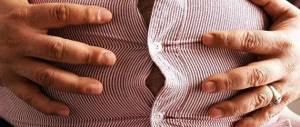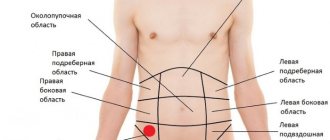If the lower abdomen feels tight during pregnancy, you cannot ignore it. After all, this condition can be a rather alarming symptom if we are talking about the occurrence of pain in the lower abdomen in the first or second trimester. And also - a harbinger of premature birth, if we are talking about the third trimester of pregnancy.
Thinkstockphotos
The answer to the question “Why does the lower abdomen feel tight during pregnancy?” should be sought with the help of a doctor. After all, only he can weigh the subjective and objective causes of pain on the scales of professionalism. And assess the degree of danger, if any.
Pulling in the lower abdomen during pregnancy: when it is not dangerous
Pain in the lower abdomen, starting from about the sixth week of pregnancy, can occur due to digestive problems. Many changes in the body of the expectant mother often lead to constipation and the resulting pain, which is sometimes differentiated precisely as a nagging pain in the lower abdomen. If discomfort occurs due to constipation, you need to take very simple measures: drink more water (up to 2 liters per day) and increase the amount of fiber in your diet.
Sometimes during pregnancy, the lower abdomen feels tight due to the fact that the growing uterus begins to put pressure on the bladder, which responds to this with nagging pain and frequent urination. The adaptive abilities of the female body are very high and, most likely, this pain will soon disappear - the internal organs will “get used” to the need to crowd together for the sake of a new life.
Mild pain in the lower abdomen can also occur due to tension in the ligaments that support the growing uterus. The onset of such pain usually occurs around the 12th week of pregnancy. If there are no other symptoms, which we will discuss below, there is no need to worry.
Burda Media
Why does the lower abdomen hurt in early pregnancy?
- Often the stomach hurts and for a completely banal reason. The fact is that the uterus grows, increases in size and, of course, becomes heavier and heavier. The abdominal muscles, which support the uterus, begin to stretch under its weight, which leads to pain during pregnancy. As a rule, these pains are not intense; the stomach aches a little, although it may sting.
- If the fetus is large enough or you are expecting twins, then under the weight of the uterus an umbilical hernia may develop or the abdominal muscles will separate somewhat, and a white line will appear on the abdomen. And of course your stomach will ache slightly.
- In the last trimester, closer to childbirth, the pelvic bones begin to gradually diverge, and this can also lead to pain in the lower abdomen.
- And finally, the stomach hurts during pregnancy simply because in the early stages there are some reasons related not to the pregnancy itself, but to the gastrointestinal tract and digestive problems.
In any case, if your stomach hurts while carrying a child, you should consult an obstetrician-gynecologist and take timely and adequate measures.
Ectopic pregnancy
Another common cause of stomach pain is an ectopic pregnancy. In this case, the fertilized egg, instead of moving into the uterine cavity and attaching to its wall, simply remains in the place where conception occurred - in the fallopian tube. At first, it may not make itself felt at all, or it develops like a normal pregnancy, but as the fertilized egg grows, there is little room for it in the tube, which is manifested by sharp pain of a cramping nature, localized in the right or left side of the abdomen .
This usually happens over a fairly long period of 8-10 weeks. The pain can be so severe that it can cause a woman to lose consciousness. As a rule, they radiate to the rectum, but they can also radiate to the leg or to the hypochondrium area.
At first, the woman will find all the signs of a normal pregnancy in the early stages. But if she delays contacting the antenatal clinic, she will not be able to independently determine that the pregnancy is ectopic. In this case, pain on one side of the abdomen may indicate that the egg, which has increased in size, no longer fits in the narrow space. Further delay can lead to pipe rupture and quite serious consequences.
Is nagging pain in the lower abdomen a symptom of an ectopic pregnancy?
All expectant mothers need to know which pain in the lower abdomen during pregnancy in the first trimester is dangerous and requires immediate doctor intervention.
If your lower abdomen feels tight during pregnancy, it could be an ectopic pregnancy. An ectopic pregnancy occurs when a fertilized egg is implanted not in the uterine cavity, as it usually happens, but in the lining of the fallopian tube. In this case, it is impossible to save the child's life. We are talking only about preserving the health (and sometimes life) of a woman.
Fotolia
Fortunately, ectopic pregnancy is not that common: only 1-2% of all pregnancies. Therefore, you should not differentiate any pain in the lower abdomen during pregnancy as a symptom of an ectopic pregnancy. But under no circumstances should you postpone a visit to the doctor: let us repeat: with an ectopic pregnancy, we can talk about preserving reproductive function, and in the most severe cases, about the woman’s life.
Why does ectopic pregnancy happen? Ectopic pregnancy is a consequence of poor patency of the fallopian tubes. And this problem arises against the background of frequent inflammatory diseases, as well as after sexually transmitted infections (chlamydia, gonorrhea, etc.). Poor patency of the fallopian tubes also occurs with endometriosis, as well as after operations, the purpose of which is to remove adhesions in the fallopian tubes. The risk of ectopic pregnancy also increases after infertility treatment, after successful or unsuccessful IVF.
Burda Media
What are the signs of an ectopic pregnancy? Unfortunately, there are no reliable early signs of ectopic pregnancy. Sometimes the first suspicions of an ectopic pregnancy arise simultaneously with sharp abdominal pain, a sudden increase in blood pressure, dizziness, and bleeding. But even in this case, the same pathological symptoms are possible with a normal intrauterine pregnancy.
The truth can only be established through laparoscopic surgery. Therefore, if you suspect an ectopic pregnancy, it is extremely unreasonable to refuse to carry out this diagnostic and at the same time therapeutic procedure.
Suspicion of an ectopic pregnancy can be suggested by monitoring the level of human chorionic gonadotropin, a hormone that is produced only during pregnancy. It appears in both uterine and ectopic pregnancies. But with an ectopic pregnancy, the level and growth may be lower. Alas, control of the level of this hormone is carried out only if the woman has already had cases of ectopic pregnancy. And even then not always.
Fotolia
A diagnosis (or rather, an assumption) of an ectopic pregnancy can also be made after an ultrasound examination at about 5 weeks of pregnancy. But due to various purely medical factors, ultrasound results are never accepted as absolutely reliable and laparoscopic surgery is almost always prescribed.
Why is an ectopic pregnancy dangerous? An improperly attached embryo grows and sooner or later it becomes crowded in the fallopian tube or cervix, and it tears living tissues. This can be dangerous for a woman’s life, but an ectopic pregnancy poses an even greater danger to a woman’s reproductive function. Indeed, in the case of an ectopic pregnancy, the fallopian tube is very often removed.
If this can be avoided, the doctor prescribes rehabilitation measures aimed at preventing adhesions and normalizing hormonal levels. The next pregnancy is recommended no earlier than 6 months after the ectopic pregnancy. Before this, it is advisable to perform diagnostic laparoscopy, which allows you to assess the condition of the fallopian tube and other pelvic organs.
Fotolia
Pulling in the stomach - what does it mean?
A nagging abdominal pain may appear for the following reasons:
- one of the main sources of this phenomenon may be the process of contraction of the muscles of the uterus. If you put your hand on your stomach in late pregnancy, you will be able to feel how it hardens, which is quite natural. However, it is worth remembering that the tone of the uterus and a hard abdomen can pose a danger to the unborn baby;
- in the early stages of pregnancy, nagging pain in the abdominal area can act as the first signs of pregnancy. In this case, sensations appear that are similar to menstrual symptoms;
- such pain can be directly related to the fact that there is a rush of blood to the uterus, since the blood circulation process begins to increase in this organ.
A pulling sensation in the abdominal area can act as characteristic physiological signs that are among the main symptoms of pregnancy. Most often, such a feeling does not pose a danger to the health of the expectant mother or the baby, but at the same time, it is worth consulting with your doctor, who monitors the course of pregnancy in order to be able to prevent the formation of undesirable and serious consequences (for example, miscarriage) in time. .
The appearance of nagging pain in the early stages is considered normal, not only due to the fact that the flow of blood to the uterus increases, but also as a result of stretching and swelling of the uterine ligaments. The fact is that they must have time to stretch along with the enlarging uterus. As a result, this phenomenon can lead to the formation of a rather unpleasant feeling of discomfort and panic.
Normally, at the beginning of pregnancy, the stomach does not pull constantly. In order for all the unpleasant sensations to completely go away, it is often enough to simply lie down and relax.
However, if a woman is in the early stages of pregnancy, her stomach constantly pulls and the discomfort does not go away even after a horizontal position is assumed, you should be wary. This phenomenon may be the first and main sign of a threatened miscarriage, and in no case should you delay visiting a doctor.
When there is a threat of miscarriage, a rather strong and rapid increase in unpleasant sensations occurs, which turns into pain, and copious bleeding begins to form.
During the first few weeks of pregnancy, a pulling sensation in the abdominal area may appear due to the fact that the embryo has attached in the wrong place (for example, in the fallopian tube). This phenomenon is called an ectopic pregnancy. The fact is that only one pipe is affected - either the right or the left. Consequently, a pulling sensation will appear either on the right or left in the lower abdomen. The most important thing is that such pain varies in intensity and can be permanent.
If the pregnancy proceeds correctly and there are no complications, then the tugging feeling will be almost unnoticeable, thanks to which the woman can continue to lead a completely normal lifestyle.
Pain in the lower abdomen - threat of pregnancy failure
If during pregnancy the lower abdomen feels tight, this could be a threat of miscarriage. This problem occurs especially often in the early stages of pregnancy. In European clinics, unlike Ukrainian ones, in such cases no measures are taken to preserve the pregnancy. It is believed that early termination of pregnancy is a natural selection process. In relation to a woman who has already felt like a future mother, this statement sounds cruel. And yet this is true: medical research shows that no less than 60% of all miscarriages occur due to the “fault” of the uterus, which unmistakably recognizes a genetic marriage and denies such an embryo further development. Practice shows that almost all mothers who experience a miscarriage in the early stages of pregnancy soon become pregnant again and give birth to healthy children. True, before trying to get pregnant again, you need to maintain an interval of three to six months.
Fotolia
However, if nagging pain in the lower abdomen during pregnancy develops into a miscarriage and this happens more than once, the woman needs to undergo diagnostic tests. This is necessary in order to clearly establish the cause of miscarriage. It could be:
- hormonal deficiency that interferes with fetal development,
- abnormalities in the structure of the uterus,
- genetic failures,
- Rhesus conflict.
Burda Media
Why does my stomach hurt in early pregnancy?
Generally speaking, your stomach should never hurt. Pain is a protective reflex of the body, which indicates that not everything is going as it should and therefore sometimes urgent intervention is required. Strictly speaking, even painful menstruation is no longer quite the norm. But abdominal pain that occurs in the early stages may indicate, for example, stretching of tissues and ligaments as a result of hormonal changes in the body. However, the causes of abdominal pain in a pregnant woman may not be so harmless.
Causes of lower abdominal pain in early pregnancy
- Sometimes, in the event of a hormonal imbalance, for example, low production in the body of such an important hormone as progesterone, a phenomenon such as uterine tone occurs. Many women know him firsthand. The uterus tenses, hardens, and the entire abdomen becomes as if “stone”. If you do not pay attention to this phenomenon, it may result in termination of pregnancy. You definitely need to consult a gynecologist. If the doctor considers this situation dangerous, he will prescribe you the necessary medications, lack of physical activity, and in some cases, even bed rest. And you will need to strictly follow all medical instructions if you want the pregnancy to end successfully.
- If your stomach hurts, in the early stages it is due to intestinal problems. During this difficult period for a woman, especially when she suffers from toxicosis, there are often manifestations of bloating, digestive disorders, colic, and cramps. Therefore, the expectant mother should reconsider her usual diet and exclude from her menu those foods that cause her a feeling of discomfort and indigestion. In the early stages of pregnancy, even constipation can provoke uterine tone, which is now extremely undesirable.
- Abdominal pain can also be caused by gynecological problems. Changes in hormonal levels that pregnancy entails can lead to the activation of various diseases, for example, to manifestations of cystic ovarian lesions. It is possible that you have had a cyst for a long time, it just did not manifest itself in any way, and you had no idea about its existence. But now, when the level of estrogen in your blood has increased, you feel pain or cramping on one side of your abdomen. To decide whether it is possible to leave everything as it is until childbirth or whether it is necessary to urgently take some measures, which only the observing gynecologist can do.
- And, finally, abdominal pain in the early stages manifests itself as a result of some diseases that are not related to gynecology. For example, your appendix may become inflamed. Of course, in order to establish this, you need to undergo an appropriate examination.
All abdominal pain in pregnant women is divided into two types:
Non-obstetric pain
These are painful sensations associated with the fact that during pregnancy the abdominal muscles begin to stretch, the ligaments present here begin to stretch, and the internal organs surrounding the growing uterus begin to shift. Surgical problems also occur, such as inflammation of the appendix. Pain of this kind is not dangerous for the development of pregnancy and does not lead to its termination.
Obstetric type pain
These are pains that really pose a threat to pregnancy in the early stages. Usually these are aching painful sensations in the lower abdomen or nagging pain. Such pain, as a rule, is localized in a specific area and does not radiate to other places. Most often, they are accompanied by spotting bloody discharge.
If you do not consult a specialist in time and find out why your stomach hurts during pregnancy, and also do not start appropriate treatment in the early stages, then the bleeding will increase, contractions may begin and spontaneous termination of pregnancy may occur. Such pain is usually caused by stress, physical activity, infectious and inflammatory processes, as well as various pathologies in the development of the embryo.
Is bleeding a risk of miscarriage?
Quite often during pregnancy, if the lower abdomen is tight, spotting also occurs. This is the main symptom of a threatened miscarriage, but the appearance of bloody discharge does not always indicate a threat of miscarriage. In early pregnancy, this condition occurs quite often, but does not always end in miscarriage. Often, nagging pain in the lower abdomen is accompanied not only by bleeding of varying intensity and quality (brown blood clots, rather bright blood, pinkish mucous discharge, etc.), but also by colic, fever, weakness, and sometimes vomiting. The cause of this condition can only be understood doctor, don’t put off visiting him.
When do you need to urgently consult a doctor if you experience pain?
Severe abdominal pain may be symptoms of the following dangerous conditions:
- Miscarriage or spontaneous abortion. There may be an outpouring of water, severe bleeding with inclusions as during menstruation. The pain intensifies and the pain may continue throughout the day. The causes of miscarriage can be physical activity, bad habits, a hereditary predisposition to miscarriage, a history of abortion, etc.
- Ectopic pregnancy. With this pathology, implantation of the egg occurs not in the uterus, but in the fallopian tube. If the pregnancy is one week and the stomach hurts, and the pain is sharp and stabbing in nature, this may indicate the attachment of the egg outside the uterus. If, with a positive pregnancy test, brown spots on your underwear, dizziness, weakness and nausea, as well as pain in the lower abdomen are observed, you should immediately consult a doctor. These may be symptoms of an ectopic pregnancy. The cause of the malaise is that as the egg grows, it begins to deform the fallopian tube. If this condition is left without medical attention, it can lead to a pipe rupture. If a pipe ruptures, urgent hospitalization will be required.
- Frozen pregnancy. With this condition, the abdominal pain is not sharp. The woman feels heaviness in the uterus, and foul-smelling vaginal discharge may appear. The mammary glands do not swell, but become soft. This may indicate a frozen pregnancy and death of the embryo. The condition requires surgery and cleaning.
If your lower abdomen hurts in the early stages of pregnancy, but these sensations do not cause severe discomfort, you can routinely report them to your doctor at your appointment. If the pain is acute and there is bleeding, you need to see a gynecologist as soon as possible.
For any location of pain, only a doctor can determine the cause. For a more accurate diagnosis, additional examinations may be prescribed to determine the cause of the pain and exclude an ectopic or frozen pregnancy.
Video: Stomach Pain During Pregnancy | Pregnancy | Advice for Pregnant Women
Attention!
This article is posted for informational purposes only and under no circumstances constitutes scientific material or medical advice and should not serve as a substitute for an in-person consultation with a professional physician.
For diagnostics, diagnosis and treatment, contact qualified doctors! Number of reads: 975 Date of publication: 06/19/2017
Gynecologists - search service and appointment with gynecologists in Moscow
A special case
Sometimes during pregnancy, the lower abdomen feels tight due to the occurrence of acute conditions or exacerbation of certain chronic diseases. We are talking about appendicitis, pancreatitis, intestinal obstruction. Pain in the lower abdomen in such cases is of a specific nature: it increases and is accompanied by an increase in body temperature, nausea, and dizziness. In such cases, it is necessary to seek medical help as soon as possible and call an ambulance. In some cases, for example, with sudden inflammation of the appendix, surgical intervention may be required, which in 99% of cases does not harm the pregnancy.
Conclusion: if a nagging pain in the lower abdomen occurs during pregnancy, you should not look for the cause of its occurrence on your own. A consultation with a doctor will help relieve anxiety, and perhaps avoid serious complications.
Physiological reason for stomach pain
Early in pregnancy, pain is common. It is largely physiological in nature. In this case, the woman does not feel any particular discomfort and the symptoms do not increase. Along with abdominal pain, a pulling sensation in the lumbar region may appear. In order to alleviate the symptoms in this case, you just need to lie down and give the body a little rest.
Many women, especially during their first pregnancy, are concerned with the question: why does the stomach hurt in the early stages? Such symptoms can occur as early as 7-10 days after conception. At the same time, some representatives of the fair sex do not even suspect that fertilization has occurred. Such sensations arise as a result of the fact that the fertilized egg begins to penetrate the layers of the endometrium. During this, the mucous membranes and blood vessels are damaged. Such symptoms are very rarely paid attention to, since they are similar to PMS. During the second and next pregnancy, the woman is already aware and accurately determines the factors of such pain.
The cause of pain during the first month is also a change in hormonal levels. The amount of progesterone in the girl’s body increases, which causes some pain discomfort.
Physiological factors also include the fact that the body changes as a whole in the early stages:
- ligaments are stretched;
- the center of gravity changes;
- blood flow to the pelvic organs increases, etc.
These factors are safe for the health of the girl and the unborn child. But you should not neglect your health, but immediately consult a specialist, since these same symptoms can be caused by more serious factors.
Physiological nagging pain
Every woman, in early or late pregnancy, experiences painful sensations in the lower abdomen. If in the early stages some expectant mothers manage to avoid this, then in the later stages, when the tummy significantly increases in size and provokes stretching of the muscles of the anterior abdominal wall, this symptom simply cannot be avoided.
Can also become:
- problems associated with the gastrointestinal tract, such as constipation, heartburn or dysbiosis;
- exacerbation of pancreatitis or inflammation of appendicitis;
- pathologies in the genitourinary system, for example, diseases of the kidneys, ovaries, bladder.
Moreover, these causes can easily be eliminated independently at home. For example, you can relieve discomfort by relaxing and resting in a horizontal position, taking a no-shpa tablet or using suppositories with papaverine.
Thus, pain in the lower abdomen can have many causes. When determining their safety for the health of the expectant mother and her child, it is necessary to take into account the general physical condition of the woman and the duration of pregnancy. If you have persistent suspicions, the best option would be to consult a doctor, which will help avoid serious problems and preserve the health of the woman and her baby.
- Related Posts
- Why does shortness of breath bother you during pregnancy and what to do?
- What are the reasons for chest pain during pregnancy?
- Why does a pregnant woman experience discomfort in the form of heaviness in the abdomen?
Nagging pain at the end of pregnancy
If pain is observed in the lower segment of the abdomen at a later stage, the expectant mother needs to contact the antenatal clinic as soon as possible to establish the true cause of such symptoms. It does not matter what nature the pain is: long-term or short-term. This is the only way to avoid some very negative situations.
At 30-34 weeks, pain quite often becomes a companion to pregnancy.
Intense growth of the fetus leads to overstretching of the muscles, which cannot keep up with the growth rate of the uterus. These symptoms are especially well known to women expecting a large child. Nagging pain is often accompanied by pain of a different nature, sudden, which can manifest itself with any sudden movement or even coughing. In this situation, you should think about strengthening and developing muscle flexibility by performing feasible physical exercises or a special set of exercises for pregnant women. A great option would be to visit the pool .
Reading...
What are the reasons for chest pain during pregnancy?
Additionally > What happens to the fetus and woman at 9 weeks of pregnancy
An increase in pain in the later stages or a change in its nature towards more severe and cramping pain may indicate a threat of premature birth. It is especially necessary to be vigilant if the stomach becomes noticeably hard during this period or if bloody discharge appears. Usually in this case, urgent hospitalization is indicated. In a hospital setting, treatment is carried out aimed at maintaining pregnancy, since the birth of a child at this stage is extremely undesirable due to the insufficiently formed pulmonary system.
Very dangerous signs indicating placental abruption are pain radiating to the lower abdomen of a cramping nature. The baby's oxygen supply may be cut off, which can lead to hypoxia. This condition of the expectant mother can be caused by a domestic injury, high blood pressure, or excessive physical activity. In this case, the decision is most often made to perform a cesarean section.
The nature of pain during ectopic pregnancy
Pain in the lower abdomen during the first weeks of pregnancy may occur due to the attachment of the embryo outside the uterus, for example, in the fallopian tube. In medical practice, this phenomenon is called an ectopic pregnancy. In reality, a woman is affected by one of the tubes: the left or the right, depending on what causes nagging pain of a constant, stabbing and intense nature in the lower right or left part of the abdomen. In addition, the following symptoms are added:
- general weakness;
- attacks of nausea accompanied by vomiting;
- lack of appetite;
- lowering blood pressure;
- increased heart rate;
- paleness of the skin and fainting.
Delayed diagnosis leads to rupture of the fallopian tube as a result of an increase in the size of the embryo. This process is accompanied by strong and very profuse bleeding, which can lead to disastrous consequences and even the death of the woman. The sooner a woman seeks qualified help when these symptoms appear, the greater her chances of getting minimal consequences, especially since this pathology is quite difficult to diagnose.
Встречаются в своих апартаментах, проверенные путаны Владимира, все услуги не обязательно строго в презервативе, проверь на yesvladimira.ru. Каждая дива имеет идеальное по всем параметрам тело, а также справляется со своим ремеслом на отлично. Сексуальные проверенные путаны Владимира, восхитительные и горячие, они такие заботливые и профессиональные, что у тебя будет сегодня классный секс. Окунись в удовольствие.








